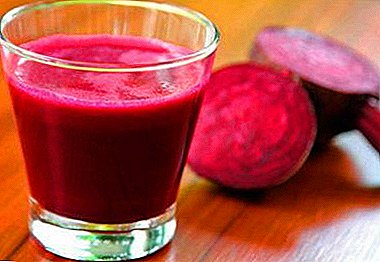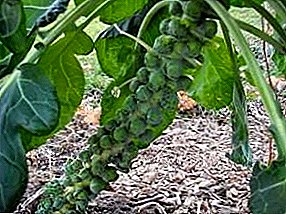
When a runny nose and nasal congestion appear, everyone resorts to the use of medication.
Nevertheless, not many people know about the antibacterial properties of ordinary beets, which are widely used in traditional medicine.
This is one of the most effective methods of treating the common cold, both for an adult and for a child. From our article you will find out when you can, and when you can not use this product for medicinal purposes, as well as how to properly use beet juice for the treatment of rhinitis.
When can be used for medicinal purposes?
As it turned out, the beets were originally grown exclusively for use in alternative medicine, and after that they began to be eaten. Root crop has antibacterial, anti-inflammatory and wound-healing properties. Beet juice is able to cure such ENT diseases:
- Sinusitis
- Frontline
- Angina.
- Rhinopharyngitis.
- Laryngitis.
- Flu.
- SARS.
- Sphenoiditis.
- Tracheitis.
- Etmoiditis.
Vegetable stores a lot of useful substances, such as:
- Iron.
- Zinc.
- Folic acid.
- Iodine.
- Magnesium.
- Phosphorus.
- Copper.
- Vitamins of group B, C, E and A.
Thanks to this composition root juice is able to provide the following actions:
- To expand the vessels in the nasal cavity.
- Thin the mucus.
- Removes puffiness.
- Antibacterial action.
- Improves excretion of mucus.
We told more about the medicinal properties of beets here, and from this article you will learn about the chemical composition of the red root, as well as how it is useful and harmful to human health.
When can not eat?
 Red beet juice is able to fight only with the common cold caused by viral infections. When pathogenic bacteria are ingested, a vegetable does not help, but only can harm the body.
Red beet juice is able to fight only with the common cold caused by viral infections. When pathogenic bacteria are ingested, a vegetable does not help, but only can harm the body.
To determine the viral or bacterial runny nose in an adult and a child by the color of mucus from the nose. When bacteria enters the body, mucus acquires yellowish-green shades. In this case, the use of drops is not recommended until the cause of the disease is ascertained.
During the use of traditional medicine, consultation of a specialist is necessary to determine the correct diagnosis. and prescription of further treatment. The course is carried out comprehensively with medical drugs.
Benefit and harm
With the proper use of beet juice for the treatment of rhinitis, the recovery process can be accelerated, both for an adult and for a child. Root crop is widely used in pediatrics, as an auxiliary folk remedy in combination with drug therapy.
Important! In order not to burn the delicate mucous comb, concentrated beet juice is pre-diluted with boiled water. Drops do not injure the mucous and are not addictive.
Contraindications
Contraindications do not have a drop, the only exception is intolerance to the root. It should be borne in mind that when mixing beetroot juice with honey, a strong allergic reaction is possible. In the presence of allergic reactions to this vegetable, this type of treatment should not be used, in order to avoid deterioration.
Rules for the use of beetroot
In the preparation of a remedy for rhinitis is nothing complicated. You must select a quality product and mix with additional ingredients. Before using the root crop is subjected to sanitary treatments - the top layer of the peel is thoroughly washed and cut off. For the treatment of rhinitis is preparing a concentrated beet juice.
- Root wash and rinse with boiling water.
- Peel, grate, squeeze the resulting gruel through gauze;
 The resulting juice is left in the refrigerator for 1 hour, before use, heat in the palms to room temperature.
The resulting juice is left in the refrigerator for 1 hour, before use, heat in the palms to room temperature.- For adults, apply concentrated juice, for children aged 3-6 years, it is mixed with water in the ratio 1: 2, and from 0 to 3 years the proportion is 1: 3.
- Instill drops should be in the cleaned nasal passage 2 drops in each nostril 3-4 times a day for adults and children from 6 years. For children from 0-6 1 drop 2-3 times a day.
- Store drops in the refrigerator for no more than 3 days.
The therapeutic effect will be noticeable after 3-4 days, and for full recovery, the treatment course is 7 days. There is a slight difference in beet juice treatment for adults and children. Children under 6 years old juice diluted with boiled water 1: 1 or 1: 2. Adults use a concentrated formulation during illness.
Important! During the preparation of a drop for children, beet juice is diluted with water, then mixed with other ingredients!
Treatment of ENT diseases, how to apply
Consider the most popular ENT diseases and how to treat them.
- Sinusitis Beet juice is often used as an additional treatment on the background of drug therapy. It is effective in the treatment of the initial stage of the disease and for the prevention of chronic sinusitis with frequent exacerbation. Suitable drops of freshly squeezed and boiled root vegetables.
The question remains, how to apply for sinus, whether to dilute or instilled with clean juice? Recommend to adults 2-3 drops up to 4-5 times a day, and for children diluted with water 1 drop 2-3 times a day. - Cold rhinitis. More often, from cold colds for children and adults prepare beetroot-carrot with honey or beetroot honey drops according to simple recipes. The medicine is made at the rate of 3 tsp of juice and 1 tsp of honey, leave to stand for an hour. For adults, 2-3 drops, for children, 1 drop.
- Chronic runny nose. For the treatment of chronic rhinitis, you can use a different healing composition. To do this, mix carrot and beet juice in equal proportions, and add propolis tincture. Drops are suitable for adults and children.
- With nasal sinus congestion You can use any recipe, because the vegetable removes puffiness and thins mucus.
- Adenoids. Children's disease, which often causes a cold. In this case, without additional additives, we use beet juice in a diluted form. They need to flush the nasal cavity. Before rinsing, clean the nasal passages from mucus with saline. Procedures are carried out 2-4 times a day.
Beet juice is an excellent drop for the treatment of rhinitis in children and adults. Drip 4-5 days. If during this time the disease does not pass, you should see a specialist. In general, beetroot will contribute to a speedy recovery in combination with medical therapy.
Side effects
There are several side effects when using beet juice:
- Allergic reaction in the form of swelling and rash.
- Sneezing
- Itching and burning in the nose.
- Increased symptoms of the disease.
If any of the reasons arise, the treatment with this method should be discontinued.
Beets contain a mine of microelements and vitamins necessary for health. Its effectiveness in the treatment of sinusitis, rhinitis and adenoids in children has been proven for years. After the first application, the result will be noticeable, but for a lasting effect, the course of treatment should be 6-7 days.


 The resulting juice is left in the refrigerator for 1 hour, before use, heat in the palms to room temperature.
The resulting juice is left in the refrigerator for 1 hour, before use, heat in the palms to room temperature.









